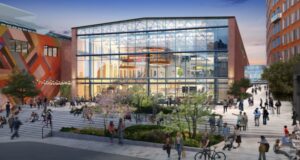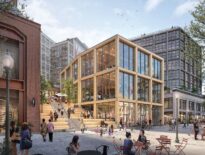Massport is redoubling its objections to plans for new dedicated MBTA bus lanes in South Boston and wants a say over details of 636 housing units approved for the former Boston Edison property.
The agency has been consistently wary of the proposed 1.7 million-square-foot L Street Station project, which also will include office, lab, hotel and retail space, because of its proximity to Massport’s Conley Container Terminal.
Conflicts between Massport’s existing freight routes to Interstates 90 and 93 and the city of Boston’s plans for a $22 million dedicated bus lane on Summer Street remain a point of contention, according to a comment letter submitted to the state Executive Office of Energy and Environmental Affairs.
“This corridor is a key link on the ‘last mile’ connection between the port and the interstate highway system, and it cannot be compromised,” wrote Joel Barrera, Massport’s director of strategic and business planning.
Redgate and Hilco Redevelopment received Boston Planning and Development Agency approval in February for the project, which includes an agreement to pay $10 million for public transit improvements in South Boston. The property is primarily served by four MBTA bus routes from City Point to downtown and Back Bay. To offset the anticipated additional ridership, developers agreed to pay for upgrades to the City Point bus terminal, widen L Street for future bus lanes and install transit priority signals.
On May 15, the state Executive Office of Environmental Affairs approved the final environmental impact report for the project. But details of the transit upgrades are subject to future discussions that will include city officials and the MBTA.
Massport is pressing for a shared bus-freight lane as an alternative to the city’s plans for dedicated center bus lanes along Summer Street. Massport cited $850 million in investments to expand the shipping terminal’s capacity, including a new deepwater berth and new cranes and dredging projects. The new cranes – scheduled to arrive in Boston by July – would be located approximately 1,000 feet from the L Street Station development.
At the same time, L Street Station designs include a boardwalk and other outdoor amenities located 50 to 100 feet from the freight corridor.
“Security of the dedicated freight corridor is a critical Massport responsibility, and any waterfront open space must be designed with a landscaped buffer to provide maximum separation from the DFC in all locations,” Barrera wrote.
Massport also said it will press developers for a say on design of the 636 housing units in exchange for amending a deed restriction it owns on the 15-acre property. The agency acquired the deed restriction in 2013 as it was assembling parcels for the dedicated freight corridor.
In January, Massport CEO Lisa Weiland said the agency will seek a payment from the developers in exchange for lifting the deed restriction.
In the latest submission to EOEA, Massport said its decision to modify the deed restriction will hinge upon compensation, a review of the final site plan, location and density of residential units, interior noise abatement and covenant language in rental and condo agreements.
In a statement issued today, Hilco Senior Vice President Melissa Schrock said developers have “worked collaboratively with Massport, local officials and community members to determine an appropriate mix of uses, plan welcoming open space and develop a substantial community benefits and mitigation package. As we move forward, we’re committed to continuing to work with Massport, city and state agencies, the neighboring community and other area stakeholders on the transformation of this former industrial site into a true community asset.”




 |
| 




